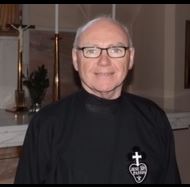Apart from Father Gareth, who was in Wales visiting his mum anyway, our Passionist Community in Glasgow are all Scots, and so we four Scots settled down last Thursday week to celebrate Burns’ Night with some lovely haggis, neeps and tatties. Being the only drinker in the community I was also able to enjoy a wee dram of 15-year-old Glenfiddich with it, a generous gift to the community; malt whisky being reputedly the perfect complement for haggis. Of course, if Father Gareth had been there, he would have tried to make a case for Rabbie Burns being Welsh, and would probably have tortured us by reciting the Address to a Haggis in his mock Scots accent, which is truly cringe-worthy.
When I was at primary school at St. Peter’s in Partick, from 1956-63, I won a book of Burns’ poetry at a poetry recital competition. Ironically, it was for reciting a poem that wasn’t by Burns at all. It was a poem called The Sair Finger by Walter Wingate, a schoolteacher and poet from Dalry in Ayrshire, who died 100 years ago this year, about a wean wi’ a skelf in his pinkie – for non-Scots readers that means a child with a splinter in his little finger.
Much later in life, when I was a deacon in Rome, I had an unexpected and unusual request to recite a lot of Burns’ poetry. It was during one of the breaks from university and I was invited by one of my Italian Passionist colleagues to spend a few days with him at the Passionist Retreat near to city of Verona, which was his home community. Now, while Verona has more to connect it with William Shakespeare, with Romeo and Juliet, The Two gentlemen of Verona, and The Taming of the Shrew all being set there, it was Rabbie Burns who had most captivated an old Passionist priest in the community for many years and, when he heard that I was a Scot, he produced his collection of Burns’ poetry, and also a tape recorder, and had me spending hours each day reciting the poems so that he could listen to them being read in a Scots accent. Having lost my accent to a large extent, and sounding more Irish than Scots, I had to really work at it and lay it on thick. He seemed very pleased with the outcome anyway.
I know that the Scots poet Liz Lochhead recently described Burns as the Harvey Weinstien of his day, and I wouldn’t be qualified to comment on that, but I think it is also true to say that Burns influenced some extraordinary people. Abraham Lincoln for example could quote Burns’ poetry by heart and drew on Burns’ passion for social justice and the equality of human beings, often reflected in his works, when campaigning for the emancipation of slavery. Burns is also said to have inspired Martin Luther King in his I have a dream speech. Winston Churchill was another admirer, and when Bob Dylan was asked to name the lyric that had most inspired him he quoted directly from Burns’ My Love is like a red, red rose.
It has been suggested at times that Burns was anti-Catholic, but I think the most informed view is that, certainly in his poems, he was mostly critical of the Kirk, and that he was simply anti-hypocrisy in any religion, and we could all go along with that. I was going to finish with an extract from one of Burns’ poems, or perhaps one of his songs, but I know you’re really all longing to read The Sair Finger – so here it is:
You've hurt your finger? Puir wee man! Your pinkie? Deary me!
Noo, juist you haud it that wey till I get my specs and see!
My, so it is - and there's the skelf! Noo, dinna greet nae mair.
See there - my needle's gotten't out! I'm sure that wasna sair?
And noo, to make it hale the morn, Put on a wee bit saw,
And tie a Bonnie hankie roun't, Noo, there na - rin awa'!
Your finger sair ana'? Ye rogue, You're only lettin' on.
Weel, weel, then - see noo, there ye are, Row'd up the same as John!

 RSS Feed
RSS Feed
